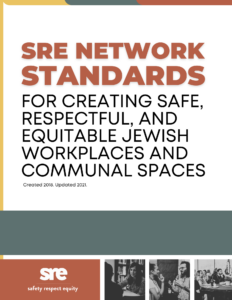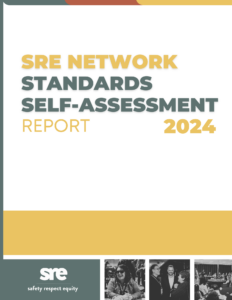SRE Network’s Standards Self-Assessment (SSA) assesses how SRE member organizations are advancing efforts to create Jewish workplaces that are free from harassment, inequity, and discrimination. While the findings of the 2024 report show that there is still much work ahead to ensure organizations are truly safe, respectful, and equitable, they also reveal a hopeful vision for the future of our Jewish communal landscape with the majority of members making meaningful progress.
SRE Network brings together 185 Jewish organizations to address gender-based harassment, discrimination, and inequity. Upon joining and each subsequent year, SRE’s member organizations complete the Standards Self-Assessment (SSA) – an accountability and learning opportunity to assess their organization’s progress on their journey toward implementing the Standards.
The release of this report comes at a time of organizational transition, nearly a year after sharing our '24-'26 Strategic Plan and just months after welcoming a new Executive Director. This report analyzes the results from the 2024 SSA, exploring how organizations' responses to the SSA have changed over time and identifying areas for growth in the coming year.
The results highlight how SRE member organizations are making gradual progress, implementing intentional change, and working to maintain their strides. The vast majority of organizations reported that they have implemented and are putting into practice SRE’s Standards, which serve as the foundational building blocks for safety (our environments are free from harassment, abuse, and violence), respect (we each engage one another with the Jewish value of kavod habriyot, which recognizes the inherent dignity of every person), and equity (all people are treated fairly and meaningful pathways are provided to close demographic disparities.).
There is still much work ahead. Implementation and communication of policies and procedures related to safety, respect, and equity remain growth areas for many, as does establishing pay equity fundamentals. It is also important to note that the 2024 SSA was taken by members in early 2024, after the events of October 7.
The inspiring news is that, in the face of one of the most painful and tumultuous years in recent history, Jewish nonprofit organizations continue to prioritize the work of creating and sustaining safe, respectful, and equitable workplaces and communal spaces, and addressing gender-based harassment and discrimination. This report offers a hopeful vision for the future of our communal landscape.
About The Standards

SRE's Standards For Creating Safe, Respectful and Equitable Jewish Workplaces and Communal Spaces
The Standards were designed by experts as a guide to prevent and address discrimination and harassment in Jewish workplaces and communal spaces. They are used as a tool for creating safe, respectful, and equitable workplaces and communal spaces–for all. They are not intended to, and do not constitute a contract or impose any legal obligation on any SRE member. The four areas of The Standards are:
About The SSA

SRE Network’s Standards Self-Assessment (SSA)
The SSA assesses organizations’ progress on their journeys toward implementing The Standards. All SRE member organizations complete the SSA upon joining, and then retake it when requested in order to measure their progress and identify areas of improvement. The 2024 SSA:
- Included 49 diagnostic questions and 3 open-ended reflection questions, as well as a new section on pay equity;
- Was taken online between January-April 2024 by 144 member organizations. One senior leader from each member organization completed the SSA.
Data Overview
77%
Average score for organizations with 6+ employees
75%
of organizations scored 80% or greater
59%
of organizations improved their total score YOY
Only 12%
of organizations scored under 70%
Average Score by Topic Area
90%
Leadership & Accountability
88%
Policies & Guidelines
74%
Education & Training
58%
Reporting & Response
76%
Pay Equity*
This data comes from the 2024 SSA results for 117 organizations, each with 6+ employees, that completed the survey by April 8, 2024. The results are based on a new SSA scoring system out of 94 points, with the addition of 27 questions in the 2024 SSA. The data should be interpreted as general indications, not definitive or precise conclusions. Data for organizations with fewer than 6 employees can be found in the full SSA report.
*Pay Equity is a new section added in the 2024 SSA. The score of this section was not included in the total score of the SSA.
Key Findings
Bright Spots
Growth Areas
Next Steps
Although there is still much work to be done on this long-term journey, member organizations are poised to continue learning from, supporting, and growing with each other. Together, our SRE community continues to make significant strides toward fostering safe, respectful, and equitable Jewish workplaces and communal spaces.
We encourage organizations to take the following next steps:
View and download the full 2024 SSA Report
Note: Your organization is welcome to take the SSA at anytime to measure progress and identify areas for improvement. Preview the assessment here to prepare your responses, and then submit your responses on the online form here to receive support and follow up materials from SRE Network.
If you have any questions about this report or SRE Network, please reach out to us at info@srenetwork.org
